Best Etsy Alternatives: 8 Ecommerce Website Builders To Rival Etsy
Our independent research projects and impartial reviews are funded in part by affiliate commissions, at no extra cost to our readers. Learn more
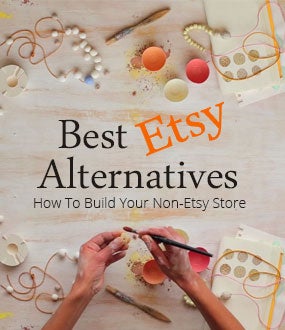 If you already have an Etsy store, you might be thinking about finding an online store builder to set up your own ecommerce store outside of Etsy.
If you already have an Etsy store, you might be thinking about finding an online store builder to set up your own ecommerce store outside of Etsy.
Why should you consider this? What are some Etsy alternatives? And what are some strategies to funnel traffic from your Etsy store to your own ecommerce store?
This article will give you a bit more direction and strategy about how to approach your business to have more control over your brand.
There are no absolute right or wrong answers, but there are a number of issues to consider when thinking about alternatives to Etsy.
We’ll get started by discussing the pros and cons of Etsy. Then we’ll take you through how to leverage Etsy to grow your online store. And finally, we’ll go into detail about some good alternatives to Etsy.
Here’s a quick preview of the Etsy alternatives we’ll be discussing. Click to go to a website builder if you see something that takes your fancy.
8 Best Etsy Alternatives
- Shopify – Best all-around ecommerce platform
- Wix eCommerce – Great value for money
- BigCommerce – Most scalable ecommerce platform
- Squarespace eCommerce – Best designed templates
- Weebly eCommerce – The one to watch
- Volusion – Best for analytics features
- GoDaddy – Fastest to build an online store
- 3dcart – Good, but there’s better out there
Now you know who they are, have a look at our top 3 Etsy alternatives in this snapshot comparison chart to get more of a feel for them:
Further Information
Best Alternatives to Etsy
When you’re looking to set up an online store, it’s easy to get lost in the masses of options on offer. Marketplaces like Etsy jostle for attention, and ecommerce website builders are around every virtual corner.
That’s why we do the research for you here at Website Builder Expert. We cut through the noise and give you hard, helpful facts so you can make the best decision. We take an in-depth look at all the most important factors, from sales tools to pricing, support and beyond.
We’ve got a mile-long list of ecommerce builders we’ve analyzed in this way, and we’ve whittled them down to the best eight Etsy alternatives.
Here’s a quick roundup of our final eight, followed by an in-depth look at the top four Etsy alternatives:
#1. Shopify
Best all-around ecommerce platform
Shopify isn’t just an ecommerce website builder – it’s designed to help people set up their very own online store and succeed long-term. It combines ease of use with powerful sales tools, such as inventory management, to make your selling life as smooth as possible.
Shopify pricing ranges from $29 to $299 per month.
Shopify Pros and Cons
| Pros | Cons |
|---|---|
|
#2. Wix eCommerce
Great value for money
While Shopify is a dedicated ecommerce platform (meaning it’s only used to create online stores), Wix is a website builder – and a very good one at that! It’s the best website builder with ecommerce functionality. You can use Wix eCommerce to create online stores in a matter of minutes, and really perfect your branding using its intuitive editing tools.
Wix eCommerce pricing ranges from $27 to $59 per month.
Wix Pros and Cons
| Pros | Cons |
|---|---|
|
|
#3. BigCommerce
Most scalable ecommerce platform
BigCommerce is another platform which, like Shopify, specializes in building online stores. It has the best in-built features on the market, and is perfect for businesses looking for a serious boost. BigCommerce has the tools to support massive growth, including impressive multi-channel integration and localized commerce.
BigCommerce pricing ranges from $29 to $249 per month.
BigCommerce Pros and Cons
| Pros | Cons |
|---|---|
|
|
#4. Squarespace Ecommerce
Best designed templates
Like Wix, Squarespace is a website builder with top notch ecommerce functions. If you want to really let your products shine, you can’t do better than Squarespace – it has the best quality designs on the market. And it’s not just a pretty face – add in a strong inventory system and social media integration and you’ve got an excellent choice.
Squarespace pricing ranges from $23 to $49 per month.
Squarespace Pros and Cons
| Pros | Cons |
|---|---|
|
|
#5. Weebly eCommerce
The one to watch
Weebly is a website builder with a special focus on ecommerce – after it’s merger with payment provider Square, you can expect lots of action in this area! It doesn’t quite match up to the powerful sales and data tools offered by its competitors, but its starting prices are the lowest around, and it’s pretty easy to use, too.
Weebly eCommerce pricing ranges from $12 to $38 per month.
Weebly Pros and Cons
| Pros | Cons |
|---|---|
|
|
#6. Volusion
Best for analytics features
Volusion is an ecommerce platform which is generally outshone by its rivals Shopify and BigCommerce. Where it does stand out, however, is its analytics and data tools. If you want lots of data and useful insight into how your business is performing, then Volusion is for you.
Volusion pricing ranges from $29 to $299 per month.
Volusion Pros and Cons
| Pros | Cons |
|---|---|
|
|
#7. GoDaddy
Fastest to build an online store
If simplicity was your favorite thing about selling through Etsy, then GoDaddy could be your perfect match. It’s the easiest ecommerce builder to use, meaning you can get your store online, set up, and selling in no time! Its ADI (Artificial Design Intelligence) software means GoDaddy can actually create a personalized store for you in minutes. It won’t give you powerful selling tools or tons of creative control, but it’s a simple and fast way to sell online.
GoDaddy pricing is $19.99 per month.
GoDaddy Pros and Cons
| Pros | Cons |
|---|---|
|
|
#8. 3dcart
Good, but there’s better out there
3dcart is a decent ecommerce platform with a detailed and thorough back-end, where you can manage everything from your inventory, to SEO, product information, and more! It has helpful tips and prompts, and has tons of potential. The downside is, it totally bombed in our user testing, coming out as the platform people were least likely to recommend. With no mobile app and bad user experience, 3dcart brings up the rear in our list of the top eight Etsy alternatives.
3dcart pricing ranges from $19 to $229 per month.
3dcart Pros and Cons
| Pros | Cons |
|---|---|
|
|
Alternative #1 – Shopify
Best all-around ecommerce platform
Shopify is a fast growing, pure ecommerce online store builder.
Not only does it have attractive-looking templates, there’s also an App Store which you can use to add a lot more advanced tools to your store as your business grows.
Adding your Etsy products to Shopify is quick and easy as there are dedicated import functions, and even apps – such as EasyImport – to make it as smooth as possible.
Shopify’s tools include functions to help you automate sales and marketing, bookkeeping, fulfillment, label printing, and more. You might not need these tools yet, but as your business grows, you can lean on these sales features when you need to.
It’s very common for online sellers to start out on Etsy, then move on ecommerce platform like Shopify when they need to grow. In fact, one Etsy store owner, LeiLei Secor, found great success selling through the marketplace before moving on to build her own ecommerce website – https://www.designedbylei.com/ – using Shopify. She was actually featured in an article on Entrepreneur.com for her business efforts!
This just goes to show how you can combine the power of Etsy and your own ecommerce website to grow your business.
Shopify is a much more advanced online store builder than website builders like Squarespace and Weebly. If you have a desire to build a very advanced, complex store, for any sized business, Shopify is an excellent candidate to consider.
With Shopify, you export your Etsy products in a CSV file (sort of like Excel), then import it into Shopify. It’s not rocket science, but if you want it even more straightforward then you can use EasyImport, a free Etsy to Shopify importer tool.
You can also easily integrate and sync your Etsy store with your Shopify store using the Etsy Marketplace Integration app. Why choose between the two when you can have the best of both worlds?
Further Information
- See our in-depth Shopify Review to find out how it can help you build a successful ecommerce store
- Find out more about Shopify’s price plans in our Shopify Pricing Review
- Read our Shopify vs Etsy comparison to see which is better for your business
Alternative #2 – Wix eCommerce
Great value for money
Wix is one of the best, pure drag and drop website builders in the website building market today. It enables you to create your own customized looking website without knowing how to code at all.
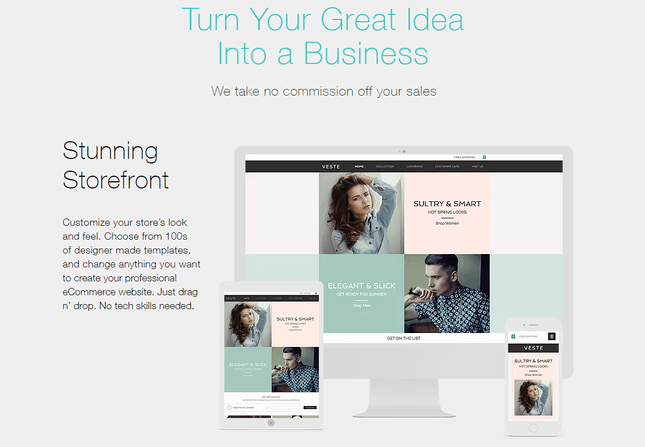
The reason why we recommend Wix is because they have the ‘Etsy Shop’ app that will enable you to fully synchronize and integrate your Etsy store into your website.
The major benefit here is that if you add or remove products from your Etsy store, these updates will automatically be reflected on your website – saving you a ton of work.
You don’t have to update Etsy, then log into your website to update the products on your website. You can synchronize your products with a click.
While the other website builders we discuss below also allow you to quickly import your Etsy products into their website builder, they don’t continuously synchronize with your Etsy account, so once you make updates to your Etsy store, you’ll have to go through the importing process again.
With Wix, the synchronization is continuous, making it easy and convenient for you.
Further Information
- Read our Wix eCommerce Review for more discussion and tips on building a store with Wix
- Read our Wix Pricing for an in-depth look at which plan is right for you
- See how Wix eCommerce compares in our list of the Best Ecommerce Website Builders
Alternative #3 - BigCommerce
Most scalable ecommerce platform
Start BigCommerce’s 15-day free trial today, then get one month free when the time comes to pick your BigCommerce premium plan. Hurry if you want to enjoy this limited-time offer!
BigCommerce is an excellent choice if you’re planning on pushing your business growth. If Etsy feels too small or short-term, and you want the freedom and power to stretch your ecommerce wings, say hello to BigCommerce.
It has the best quality in-built features of any ecommerce builder, meaning you don’t have to go running to the app store every five minutes – instead, it’s all there at your fingertips.
The other thing BigCommerce is known for is its omni-channel integration. With BigCommerce, you get a single hub to manage all your different sales channels; Amazon, eBay, Facebook, Pinterest and Google Shipping are all seamlessly and easily connected to your BigCommerce store.
You can even start selling directly on Walmart Marketplace really quickly, with an expedited application review specifically for BigCommerce merchants.
So what about Etsy? You can use multi-channel apps like Sellbrite to integrate with marketplaces, including Etsy, making it an easy and effective way to really boost your store’s online presence.
BigCommerce has everything you need to grow your brand, sales, and customer base. It has powerful ecommerce tools, fantastic SEO, and its multichannel integration is second to none. However, it’s not the easiest to use platform out there, which could jar after the simplicity of Etsy.
If you’re after a simpler option, then Shopify or Wix will be a much better choice!
Further Information
- Find out if BigCommerce is right for your online store in our BigCommerce Review
- Read our BigCommerce Pricing Review for more information on its prices
- Torn between two? Find out which is best for you:
Alternative #4 – Squarespace eCommerce
Best designed templates
Squarespace is one of the best drag-and-drop website builders available in the market today.
Its online store templates are very stylish, polished and are all responsive (so your online store will look great across all mobile devices). In fact, Squarespace has the best quality template designs around!
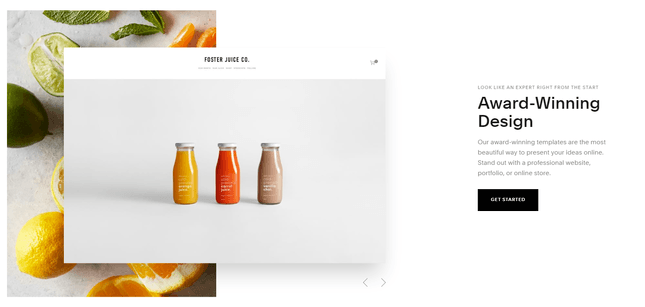
In addition to being able to create a very beautiful storefront for you, Squarespace also allows you to have full control over product variants, upload unlimited products, manage your inventory, coupon generation, set up and control sales taxes, configure shipping options and costs, manage your customer email list, and other helpful sales tools for you to build a comprehensive online store.
So, not only does Squarespace let your products shine with large, high quality images and top notch design, it also gives your store the oomph it needs to promote growth and long-term success.
Squarespace makes it easy for you to import your existing Etsy products into a Squarespace website. Here are some step-by-step instructions (and a video tutorial) on how you can quickly and seamlessly do this.
Further Information
- Read our Squarespace Ecommerce Review for a full discussion on its sales tools
- Pick the perfect price plan for your store with our Squarespace Pricing Review
- Ready to sign up to Squarespace? Get 10% off your first purchase with our exclusive Squarespace Offer Code
Best Etsy Alternatives: Head-to-Head Comparison
You’ve had the lowdown on each of the four best Etsy alternatives – but how do they compare side by side?
We carried out in-depth research to bring you the scores in the table below. The ease of use and customer scores are calculated from feedback given to us by people just like you, who we got to try out every platform on this list. Check out the results below:
| Etsy Alternative | Shopify | Wix | BigCommerce | Squarespace |
|---|---|---|---|---|
| Overall Rating | 4.7/5 | 4.3/5 | 4.2/5 | 4.2/5 |
| Ease of Use | 4.1/5 | 3.6/5 | 3.6/5 | 3.4/5 |
| Entry Plan Price | $29 | $27 | $29.95 | $23 |
| Value for Money | 3.5/5 | 4.5/5 | 3.7/5 | 4.4/5 |
| Help and Support | 4.1/5 | 4.7/5 | 3.2/5 | 3.5/5 |
| Customer Score | 4.7/5 | 4.5/5 | 3.2/5 | 4.0/5 |
What Are the Pros & Cons of Etsy?
Pros of Using Etsy
1) Easy to Setup Your Store Front
Etsy is a fantastic platform to start and grow your online business. It allows you to quickly get a store front up and running and gives you the tools to sell your products.
You don’t have to worry about getting your own hosting services, have your website designed and built, setting up payment processors, or any other technical mumble jumbo that’s reserved only for super computer users!
2) Exposure to Shoppers
Furthermore, Etsy is frequently visited by a lot of visitors who can potentially be your customer – so you don’t have to worry as much about sourcing your own prospective customers! A lot of these visitors are ready to buy. Pretty darn awesome platform if you are just starting out, don’t you think?
Cons of Using Etsy
1) Etsy Fees
So what are some drawbacks or limitations of using Etsy? Most users would agree that fees are one of the top concerns.
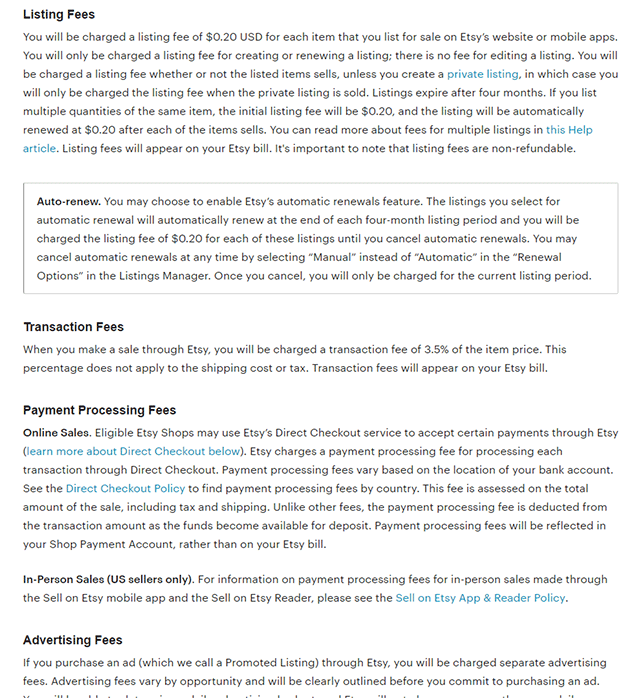
Even though you can set up a storefront for free, Etsy charges you a 3.5% fee for each sale you make. There is also a $0.20 listing fee (for each product you list) which has to be renewed / paid again every 4 months. Although individually these fees aren’t high, they really start to add up once you start to add more products and sell more.
So in a way, it’s not really “free” to set up your shop with Etsy – the saying of “there’s no such thing as a free lunch” holds true here. But it’s not unreasonable given that they are providing you a great service and platform.
2) Increasing Competition / Branding Challenges
While having a store on Etsy gives you exposure to shoppers, as more merchants create stores on Etsy, it becomes more challenging for you to stand out from other merchants.
Why? Each Etsy store looks almost the same, making it difficult for you to stand out from your competitors!
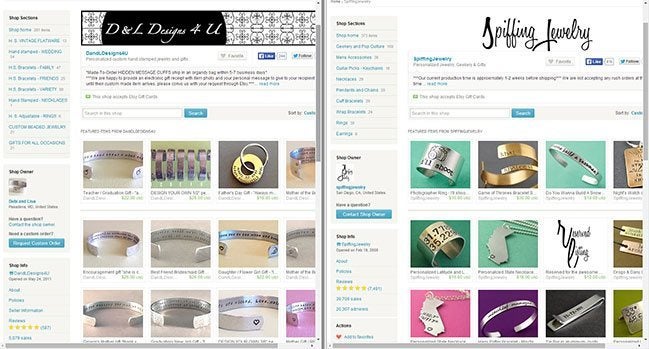
Even if a shopper sees your Etsy store, it’s challenging to really make them remember you (especially if there are others selling similar products as yours).
With your own online store (separate from Etsy), you can control your design, flow, layout and ultimately, your own branding. Design is so important when it comes to marketing your business, and a good design can help you bring back shoppers.
Let’s face it, most shoppers don’t buy on impulse, and takes a few visits before they open their wallets. So what can you do?
Here are some free, professional looking ecommerce storefront templates that you can use to build your online store.
3) Etsy Can Shut Down Your Store Without Notice
One of the challenges with using Etsy is that if they deem that you have violated their Terms of Use, they have the ability to terminate your store and account without any notifications to you.
If you inquire as why they shut down your store, their reasons could also be vague, as it is really up to you to read and understand their terms. This is one of the risks of depending on a marketplace to operate your business. The same risk exists if you are operating an Amazon store.
We’re pretty sure that Etsy conducts proper due diligence in assessing if a store owner has complied with their Terms of Use, and won’t be randomly shutting down stores just because they can. The point we’re trying to say, is that if you are relying solely on Etsy for your business, perhaps it’s time to think about what would happen to your business if Etsy shuts down your store, or if Etsy no longer existed.
How to Use Etsy with an Online Store Builder
We’re not saying that you should completely ignore Etsy, but one alternative, which we’ve seen a lot of successful Etsy store owners do, is to build a separate online store to sell your products.
So basically, your customers can purchase your products either through your Etsy store or through your own separate, online store that you create.
Here are some strategies for doing this:
1) Funnel Traffic from Etsy to Your Own Online Store
One easy strategy to take advantage of Etsy visitors is to make sure you let the shoppers who visit your Etsy store know that you have a separate store that they can visit.
You can let them know through a variety of ways:
- Insert your online store link under the “Related Links” section
- Mention your online store in your “About” page
- Mention your online store in the “Announcement” section
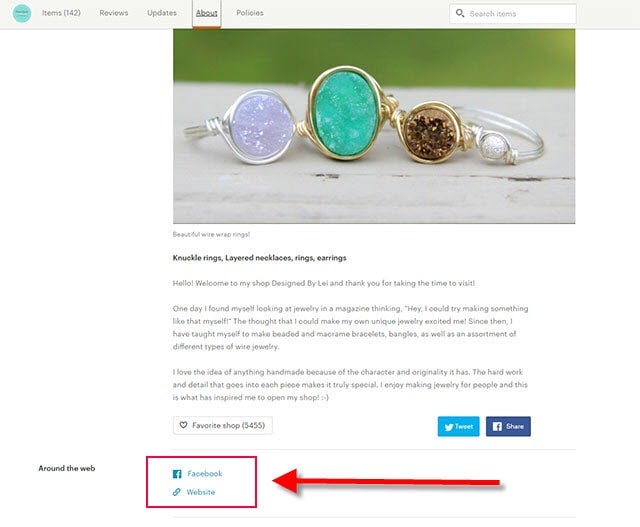
This Etsy store “Designed by Lei” (the image directly above) was featured in Entrepreneur.com. She built her ecommerce website outside of Etsy using Shopify, and have grown her business to over $100,000 in sales while attending university. More about her story below.
This way, you increase the chances of them going from shopping on Etsy to shopping on your online store where you can “wow” them with your unique website design, versus seeing you as just another cookie cutter store on Etsy.
2) Motivate Traffic to Visit Your Independent Online Store
In addition to telling shoppers that you have your own non-Etsy online store, one very effective way to “encourage” them to visit your store is to let them know that you have a broader product selection that is only available in your online store (the products are not listed on Etsy).
This is a solid strategy to gain their curiosity, lead them to your own store, and an opportunity to build your brand to stand apart from your competitors.
3) Email Your Etsy Customers to Visit Your eCommerce Store
One thing you can do is sign up your Etsy customers to your newsletter series automatically.
Good businesses have newsletters where they send regular emails to customers (or people who have expressed interests) to highlight complementary products, new products, seasonal discounts, or just cool tips and tricks as part of their overall marketing and branding exercises. Keeping in touch with people is one of the most effective ways of generating new or repeat business.
Aweber is a very powerful newsletter tool where you can write newsletters and set a specific date and time when you want the newsletter to be automatically sent out to your list of subscribers. So they make it very easy for you to keep in touch with your subscribers.
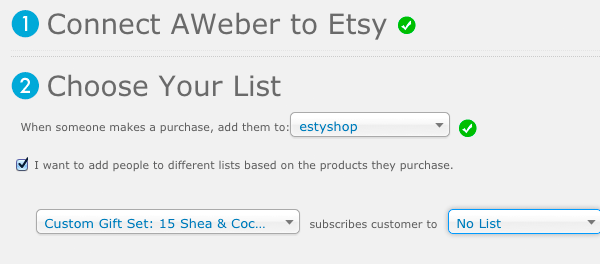
Aweber can be easily integrated with your Etsy store as well (here’s the tutorial). So whenever you generate a sale through Etsy, your customers (if they agree) can be added to your pool of newsletter subscribers. Once they are added, you can now send an automated email to them, telling them to visit your standalone ecommerce store that is outside of Etsy.
This is a very effective way of introducing existing customers to your ecommerce store, to further build your brand and reduce your economic dependence on Etsy.
4) Build Your Relationship with Shoppers
So now that they’re visiting your own online store, what can you do?
Aside from impressing them with your website design, and introducing them to more products that you don’t have on Etsy (which will also save you some listing fees, by the way), it’s time to start building your relationship with them.
Let’s face it, not all shoppers are impulsive, and takes a bit of relationship building to get them to trust you, and ultimately, buy from you.
There are two recommended ways to do this:
- Create a blog and write about interesting topics around your industry (which presumably is what they’re interested in). Write about home decoration tips, fashion advice, wedding checklists, or whatever is relevant to your industry. Create value, generate interest and build trust with these visitors. When they’re ready to buy, you will be in the front of their minds.
- Create a newsletter series where they can sign up and receive emails from you. You can send them updates on your blog (so they know when to return to read your content), and after building that trust, you can start to promote your products to them.

As they say, once someone trusts you, likes you, they’ll more likely buy from you. Treat this as an investment of your time, to turn visitors into customers.
It’s so important to build a relationship with your visitors / customers. They will most likely visit your website directly next time and hopefully, become repeat customers. Not to mention, if you build a good relationship with them, they might even share your business with their social circles!
Best Etsy Alternatives: Conclusion
There’s nothing wrong with operating your business entirely on Etsy, as Etsy is a good platform that makes it easy for you to set up shop while exposing your Etsy store to a lot of potential customers.
But we do see a lot of users finding alternatives to Etsy, and start to build their own online stores away from Etsy – and for good reasons.
If that sounds like you, then you need a top quality platform to use instead.
The 8 Best Etsy Alternatives
- Shopify – Best all-around ecommerce platform
- Wix eCommerce – Great value for money
- BigCommerce – Most scalable ecommerce platform
- Squarespace eCommerce – Best designed templates
- Weebly eCommerce – The one to watch
- Volusion – Best for analytics features
- GoDaddy – Fastest to build an online store
- 3dcart – Good, but there’s better out there
By creating your own online store, you have much more control over the design and layout of your store, which helps you build a stronger brand. With Etsy, your creative input to your Etsy store is quite limited – you’ll most likely end up looking the same as your competitors.
There are also a few strategies on how you can funnel your Etsy traffic to your own online store, and how you can engage them in a more meaningful way to build your brand. We mentioned a few of these strategies above.
By building a deeper relationship, they are more likely to buy from you, and also tell their social circles about you. On Etsy, it’s really challenging for you to stand out from your competitors (you look like just another merchant selling “stuff”).
There are really quick ways to create your own online store outside of Etsy – even if you don’t know how to code.
Shopify, Wix, BigCommerce, Squarespace, and Weebly make it really easy for you to import your Etsy products directly into their platform. All of them are drag and drop website builders, so you don’t need to know how to code in order to set up your stores.
Specifically, Shopify, Wix, and BigCommerce integrate and synchronize your Etsy products with your website, making them very interesting options for your online store.
Shopify is an advanced choice to build your online store. This is a very powerful, focused online store builder.
At the end of the day, we’re not suggesting that you abandon your Etsy store, as there are very strong merits to keeping your store on Etsy. But branching out to build your own non-Etsy store, and grow it alongside with your Etsy store can have a very strong complementary effect to your business.
Studying some ecommerce success stories and examples can also give you some inspiration on how to imitate other online store’s success.
Best Etsy Alternatives: FAQs
What is the easiest to use Etsy alternative?
We recommend GoDaddy if you’re looking for a really simple and easy to use editor. With GoDaddy’s ADI software, you’ll be up and running in no time at all! It’s definitely the fastest and easiest way of setting up your store, but it’s also not the most powerful platform, so make sure to try it out before jumping in feet (and wallet) first! Check out our GoDaddy Review to find out if it’s the builder for you!
What is the cheapest Etsy alternative?
Weebly has the cheapest ecommerce plan starting from $12 a month.
Remember, it’s worth considering a range of price plans to make sure the one you choose includes all the functionality you need.
Read our Weebly Pricing Review for further details!
What is the most comprehensive Etsy alternative?
If you want a pure ecommerce builder, Shopify is the most comprehensive platform on the market. It offers everything from abandoned cart recovery to automated sales and marketing. It’s a great option for growing your store.
Wix is another option to consider for all-round great functionality. It has an incredibly comprehensive App Market that allows you to extend the capabilities of your store so you can take it to the next level. Its apps include things like marketing and SEO extensions or social integrations.
Read our Wix eCommerce Review for an in-depth look at its features.
Which Etsy alternative has the best templates?
Squarespace is a design-oriented website builder. It has an impressive range of templates that have the ability to give your store a beautiful and professional touch.
If you want a website builder that gives you even more choice than Squarespace, it’s worth checking out Wix’s amazing range of stunning templates – there’s over 800 to choose from!
Which Etsy alternative has the best support available?
Shopify has a fantastic support network for its customers. It has a very comprehensive support center with articles on almost anything you could need. You also get 24/7 phone support, live chat and email functionality. Read our Shopify Review for more information.
Do I have to give up my Etsy store to sell somewhere else?
Not at all! With ecommerce builders like Shopify, Wix, and BigCommerce, you can sync and integrate your Etsy store with your online store for maximum selling benefits! This is called multi-channel integration and means you can keep your existing audience while growing your customer base at the same time.
Do ecommerce builders charge extra fees?
While some ecommerce builders do charge transaction fees, it’s usually easy to avoid these charges – either by changing your payment provider, upgrading your plan, or just by picking a different builder! Unlike Etsy, ecommerce builders don’t charge listing fees!
Which Etsy alternative is best for long term growth?
If you’re looking to grow your ecommerce business then we definitely recommend BigCommerce, as it’s the most scalable ecommerce platform around. If you want long-term success without rapid growth then try Shopify instead.
Found This Guide Helpful?
Did this guide benefit you? Leave a comment below.
Do you know anyone who can benefit from this guide? Send them this page or click on the share buttons on the left.
You’ll be helping us out by spreading the word about our website, and you’ll be helping them out!
Website Builder Expert aims to provide you with honest data. That’s why we conduct our own research and obtain direct, personal insight. Click here for further information.








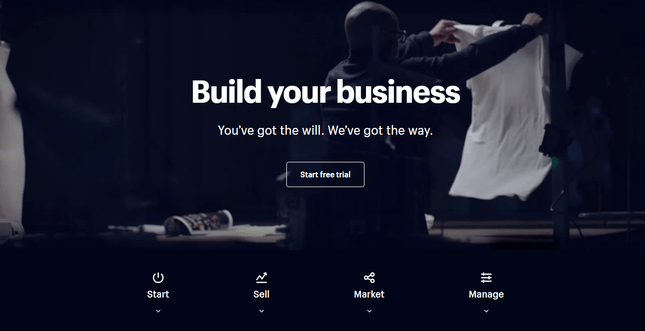
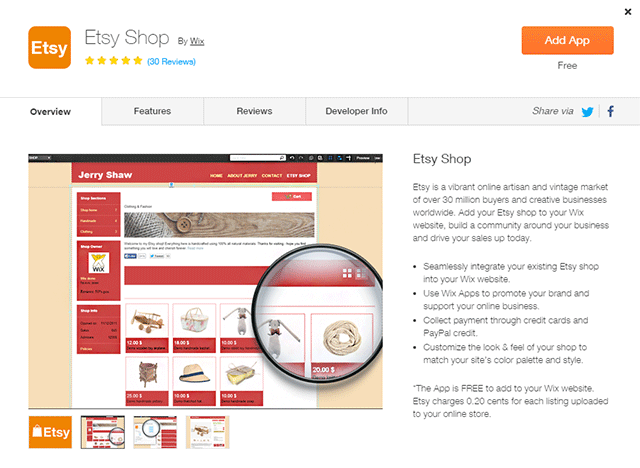
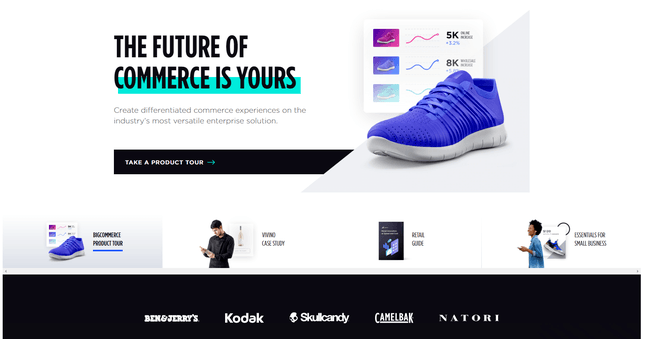
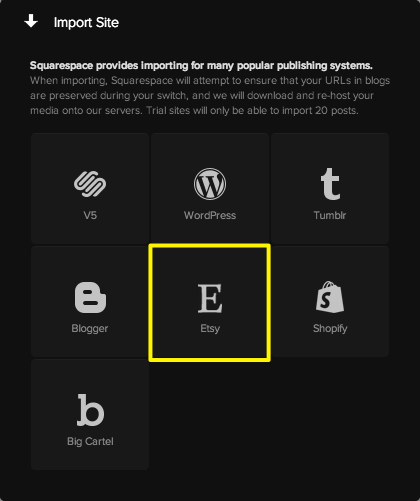
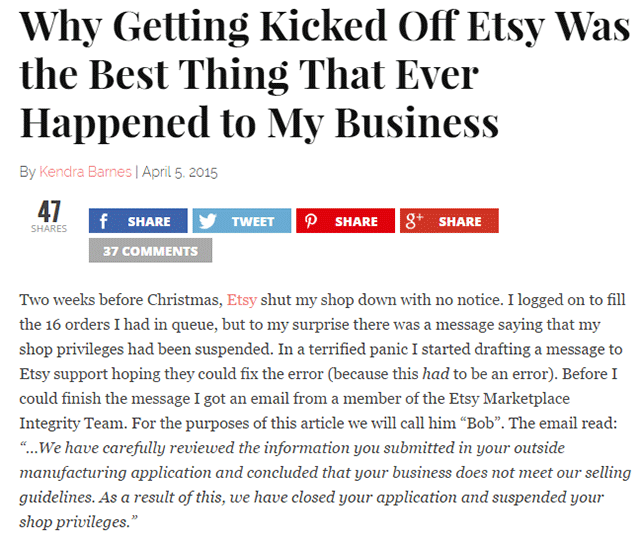
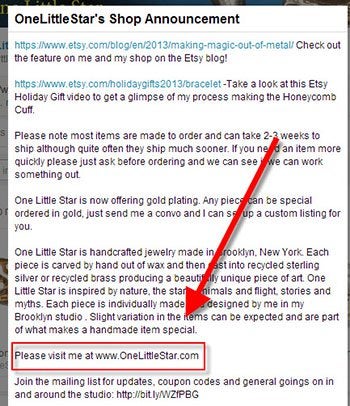
75 comments